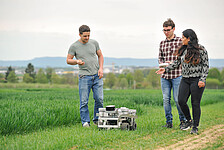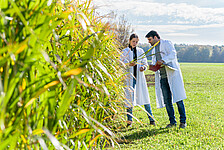Plant Health in the wake of AI
14/15 - 22 June 2024
Swedish University of Agricultural Sciences/UNITUS/ELLS
Introduction
This course is given with financial support of ELLS and the LTV faculty and in conjunction with the course Robotic weeding in sugar beet 10 – 14 June 2024 at UHOH in Stuttgart. We encourage taking both courses (even if it is not necessary to do so). However, note that the number of students are limited in both courses. There will be a shuttle transfer included between the sites.
The aim of the course is to bring together PhD and MSc students from different backgrounds (biology, agronomy, horticulture, agroecology etc.) working on plant health related areas and relate them to aspects of policy governing these fields. A special focus will be given to artificial intelligence (AI) in relation to plant health. This implies machine and deep learning methods for disease and weed monitoring as well as broader aspects and a discussion on how AI will influence the research field of plant health. No advanced understanding of machine and deep learning methods is needed. To account for the expected diversity of student backgrounds and to make sure that they are on a comparable scientific level in the management strategy discussions, some lectures in the beginning will be devoted to introducing the fundamental aspects of plant health. The lecturers will be asked to give a brief basic introduction to the subject area and then to move on and end with the latest results (which will also be discussed during the literature seminars).
Venue
Pieve Tesino, Italy with the possibility to start in Stuttgart morning 14 June or Trento midday 15 June
Participants
max. 30
Previous Knowledge
PhD students as well as MSc students interested in e.g. (agro)ecology, entomology, plant breeding, plant molecular biology, nematology, mycology, plant protection, plant pathology, IPP/IPM, pest/pathogen and plant interactions, climate change, biotic and abiotic stress.
Intended Learning Outcome (ILO)
After completing the course, the participants should be able to:
- enumarate at least three biological aspects of plant defence
- compare and contrast the natural system with the cultivated system with regards to plant defense
- describe the ecology and biology of common pests and/or pathogens
- relate molecular mechanisms of host an pest/pathogen interactions to pest/pathogen management mathods and strategies
- apply knowledge of pest/pathogen management methods and strategies to evaluate research result from case studies and the scientific literature
- Select a plant-pathogen/pest system and formulates a plant protection strategy based on the latest results and trends within plant protection as part of the project-based learning case scenarios, and use them to evalu-ate their own research in a broader perspective and especially in relation to emerging AI techniques
- give an overview of use of robotics in plant protection
- Identify sectors within plant health where Artificial Intelligence through machine and deep learning can be applied
Course Schedule
10-14 June: Robotics in weeding course hosted by University of Hohenheim led by Prof Roland Gerhards and also part of ELLS (also open to students of Plant health in the wake of AI)
Friday 14 June: Arrival in Stuttgart and demo of student results from Robotics in weeding, student presentations, introduction to case study, evening get-together. Stay-over at the local field station.
Saturday 15 June: Departure by bus from Stuttgart, Germany and study visit under way to Pieve Tesino, Italy, stay-over in around Trento.
Sunday 16 June: Arrival Pieve Tesino. Introductory lectures (history, overview of pathogens and pests, start-up of case studies).
Monday 17 June: Plant protection lectures (molecular biology of plant-pathogen interactions, resistance breeding), first literature seminar in groups, hand in title of case study
Tuesday 18 June: Lectures (IPM, showcase Pieve Tesino 1: Forest protection), preparation of case study
Wednesday 19 June: Lectures (AI in plant health, Conventional pesticides and Biologicals), second literature seminar in groups Thursday 20 June: Student discussion “where will AI take plant health?”, third litera-ture seminar.
Friday 21 June: Student presentation of case studies, course evaluation, show case Pieve Tesino 2: Apple and grape production, end party with Swedish midsummer theme.
Saturday 22 June: morning departure with transfer to Trento or Stuttgart
Course Language
English
Course Format / Teaching Methods
- Lectures
- A case study that will be presented both orally - where all students should participate actively in the discussion - and as a written report
- Presentation of own research
- Literature seminars
ECTS Credits and Workload Overview
| Number of Credits [ECTS] | 5 |
| Total workload [hours] | 125 |
| Student's own work [hours] | 80 |
| Contact Classes [hours] | 45 |
| Exam [hours] | NA |
Type of Assessment and Assessment Criteria
The marking scale will be pass/failed. The criteria for attaining the different grades will be:
- Attendance during course lectures
- Oral presentation of own research, student discussion on AI and in literature seminars based on assigned readings
- For each literature seminar, a smaller group of students will be asked to formulate and submit questions and topics for discussion based on the lectures and the assigned readings to start off the discussion. The submission of these questions and topics will be a criterium for passing.
- Oral and written report of the project-based learning case study presenting a pest/pathogen management strategy for a cultivation system or global pest/pathogen problem and how AI can benefit or challenge this. In the project an appropriate management strategy should be proposed, the impact of AI should be considered, knowledge gaps be identified, an IPM strategy be consid-ered and the growers’ social, economic and technological needs be considered.
Cultural Activities / Social Program
Friday 14 June: Evening get-together
Friday 21 June: End party with Swedish midsummer theme
Tuition Fees
None
Additional Costs
Students will have to cover food expenses provided by a local restaurant which will be ca €150/student; welcome get-together and farewell dinner are provided for free
Accommodation
€175 (for ELLS and UNITUS students)
€225 (students not from ELLS or UNITUS)
Health Insurance
Participants are responsible for their own health insurance
Application Deadline
2 April 2024
Contact persons for scientific/administrative questions
Svante Resjö, svante.resjo@slu.se


